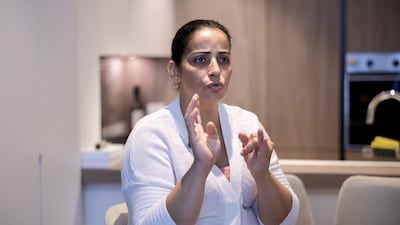Three weeks after the Dubai Marina blaze gutted large portions of a residential tower, the kindness of strangers is helping residents get back on their feet.
Many were left with nothing after fire ripped through the Marina Pinnacle building, known as Tiger Tower, on June 13, home to more than 3,800 people.
Families thanked Dubai’s ‘angels’ who continue to arrange baby cots, phone chargers and accommodation in studios and hotels.
Nigina Shakirova, 32, from Uzbekistan, was working late and frantically waited outside as her husband and young daughter ran out of the burning building.
“Our condition was terrible, my daughter had a burn on her hand and legs, people helped with medication and she is OK now,” said Ms Shakirova, who works with a real estate developer. The family now live in a one-bedroom apartment that a Dubai resident offered them.
“We feel blessed my husband and child are alive, that is the most priceless thing to have after that inferno. We deeply appreciate the angels, the amazing lady who gave us the apartment and is helping find a house with low rent. God bless these strangers for their kindness.”
Partitioned homes
The fire brought attention to the apartments in the tower, which were broken up into partitions with makeshift doors, and beds were lined up in the living room.
Occupants said they were charged between Dh2,000 and Dh3,500 monthly for partitioned spaces that afford some privacy with a bed, cupboard and dressing unit. The ‘bedsits’ or rows of beds cost about Dh1,000 a month.
Dubai Municipality has recently cracked down on partitioned units and demolished illegal sublets across the emirate.
Authorities have warned landlords against adding unauthorised partitions, as these can pose a fire hazard.
Zahra Finech, 45, who works in a Moroccan bath and spa nearby, lost all her belongings and is busy trying to obtain a replacement passport.

“My home is finished, ID cards, gold, money, clothes, everything is gone,” said the Moroccan citizen, who has lived in the UAE for eight years. “I cry a lot, I feel crazy, I want to go home because all the money I saved is gone, it’s become dust in the fire.”
She paid Dh3,000 for a partitioned space with five other women in a one-bedroom space. After the fire, the owners’ association managing the tower said it provided temporary accommodation for affected residents as per directions of the authorities.
It was then she realised that without a tenancy contract she had no legal rights.
“I will tell people now, ‘Don’t live in partition, don’t live without a contract,”” she said. “If a fire happens, no one can help you. You cannot prove your rights. I gave rent every month, I got a paper (receipt) so in my head this was legal. But I checked with a lawyer and he said that I don’t have a contract.”
Many low-wage earners are in a similar situation. Their salary is between Dh3,500 and Dh5,000, and they spend half on rent, send a chunk home and live on about Dh500. They live in partitioned apartments close to work instead of paying for transport and spending hours commuting each way.
Lost all savings
Souad Jaafro, 40, a chef at a Lebanese restaurant, has put her July holiday plans on hold as she lost her documents, money and gifts she bought for her children and parents.
She slept on the street near the tower for two days until a Dubai resident paid for hotel accommodation.
“I was in my pyjamas when firefighters told us to run. On the 20th floor there was too much smoke, I fell and woke up in an ambulance,” said the Moroccan citizen.
“I have not seen my family for two years, I bought so much for them. My salary is Dh3,000, I pay Dh1,500 for [a] bed space, send money to my family, spend what is left for my food. How can I go on holiday now? I must start from the beginning.”









Zakaria Abizaid has lived in the UAE for seven years and is currently looking for a job, having previously worked as a salesperson.
“Everything I’m wearing was given by people,” said the Moroccan citizen who lived in a bed space. “Everything in the apartment is black from the smoke. We stayed in a mosque and then this angel comes in, this lady who paid for a hotel room.”
Best, 35, a Ugandan waitress who gave just one name, fled her apartment with her laptop, bag and passport. She paid Dh1,800 for a partitioned unit in a one-bedroom apartment divided into six units.
“I must give a shout out to all the women who helped us,” she said. “One lady called us home and spread new slippers, clothes, jeans, make-up, perfume on her bed. She gave us food and hugs, made us feel at home, gave us a bag and asked us to pick up anything. She told us to be happy to be alive.
“We were shattered, these women made sure we would not go hungry. They are helping us get back on our feet.”
Community to the rescue
Dozens of people swooped in to support the residents by connecting them with people who opened up furnished homes, picked up hotel tabs and provided daily meals.
Sevgi Anar, an Australian resident, helped place more than 60 people in hotels and private apartments, and was described as an angel by the fire survivors
“My building faces Tiger and I saw what happened. I also saw a couple of boys sleeping on the ground with soot under their feet and so I split the cost of putting them in a hotel with another girl,” said Ms Anar, head of sales for a health company. “I'm not an angel. I just want to help people in difficult situations.”

Deepti Arora, head of human resources with a retail company, helped connect people who needed basic supplies.
A WhatsApp group soared to more than 1,000 members, with people offering everything from bassinets to bedsheets and pillowcases.
“When I saw people sitting on the road, a couple crying and hugging each other, it really hit me,” the Indian national said. “Our motive was to help as many people as we could based on their requirements. The community has really come forward in the Year of the Community and it has been overwhelming. None of us knew each other, we are just humans helping out humans.”


